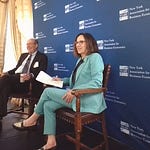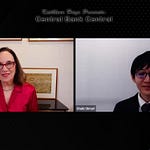Thank you News Gods!
One week after the Federal Reserve met, and one day after Fed Chair Jay Powell endured two days of testimony to Congress, I sat down with Thomas Barkin, President of the Federal Reserve Bank of Richmond since 2018, and did an in-depth interview with him.
Tom has ridden all the big waves the Fed encountered in the road into and out of the era of Covid, from runaway inflation to rate hikes so aggressive some blame the Fed for helping to spur the 2023 failure of Silicon Valley Bank. Now he’s one of the Fed’s nineteen Federal Open Market Committe policymakers trying to deal with the uncertainty around the impact of tariffs on inflation - and growth - that’s keeping the Fed in wait-and-see mode, waiting for more data and further signs from the Trump team on what their tariff endgame strategy is now.
I also must say, Thank you NYABE!
The New York Association for Business Econoics is a “non-profit organization that provides one of the preeminent forums for economists to gather in discussion of current issues impacting the US and global economy.” They also “strive to attract some of the world’s outstanding economists as speakers” which is why Tom was there today. As for me, thanks to you, NYABE. Because of your kind invitation I got to ask him questions (almost) to my heart’s content.
The format is a bit different from what you typically see here on Central Bank Central as this was recorded in a lovely banquet room with a live audience here in Manhattan. And you may have to listen a little more closely. It’s all worth it.
First and foremost, dive in and hear what President Barkin has to say about tariffs, and how they may impact inflation He has spoken to countless small businesses in his district, and bigger corporations, to hear how they are dealing with tariffs. Will they be able pass tariff costs along to customers? Tom sees some signs that after businesses raised prices in 2021 and 2022 and customers accepted them and kept buying, the same thing could happen now.
As for inflation, Tom is encouraged that it has continued to decline but is concerned that inflation expectations have been rising. On the employment side of the Fed’s dual mandate he sees a softening but still solid labor market. And he is concerned that if rising prices lead to less consumer spending this in turn could lead to less hiring.
Tariff policy in flux but tariffs are a tool 00:01:18:03
I don't know (what tariffs will do) and I don't think anybody here does, you know, we have sort of one to deal with, that's the UK. I understand it's not yet paper, but it's settled. And then we have whatever it is, there are 149 others that are still in process. So I suspect that's going to be an extended period of time to get it to settle. But I don't I don't know that. So we'll we'll see. I will say it does feel like this is a one and done negotiation. It feels like tariffs for a tool that can be used for lots of different reasons, including balanced trade and getting more defense spending and saying or whatever else we use it for and will continue to be a tool.
Hard to plan for 00:01:57:06
And so I just think if you're a business whose planning, it's hard to say. It's hard for me to believe that on any particular day, July 1st, we're going to do okay, 150 countries. Here's the rate. Now I can readjust my budget. I think that's just not very practical. So that's the first the actually is the first point, which is one of the rates that we buy.
Everyone will be looking to avoid the inevitable 00:02:18:16
And then there's the second thing, which is, okay, I've got a product that is now facing costs, added costs that I didn't have a month ago or six months ago. What do I do with that? And of course, in an environment where consumers are tired of price increases, the first signs, I'm not going to do anything. You're going to try alternative suppliers, You're going to try to negotiate this.
Unstable price and cost pressures 00:06:39:04 -
Part of that is more noise than signal. I think you can lose the market. Some people say, okay, you have cost pressure, some of it's going to get passed on. That looks like inflation. You see it and you just don't want those near-term expectations to get cemented because, of course, the long term is a combination here.
There will be some pass-through but the Fed is in control 00:08:04:03
So what's the big issue? But the world is small and so it's just not that simple. It won't be running through to price evenly by product, it won't be running through prices. It's just see what the tariffs will come to go as they get applied in real by people with money and territory. So I don't think it's as simple as what a model would show. I do think the overall point is legitimate, which is, you know, this increase in inflation shouldn't have huge implications on my expectations if the Fed has the right policy. If we get to the other side of it, that's perfectly reasonable concept. We lived with low prices over the years. But I don't think it's as simple today as it was in 2018.
Deportations are unclear but the inflow of migrants has been halted 00:16:20:03
There are clearly deportations happening. My sense is, it’s not numbers, not about the numbers, but the drop in immigration is meaningful for now. It’s a barometer,
Housing has supply problems 00:18:06:02
I can tell you that number one issue people are having is that supply is so low; it’s a huge issue. How did we get here? I think you all know that we haven't built housing for a decade after the Great Recession developers went out of business.
Old Fed framework document is really and truly dated 00:26:36:10
For those of you who haven’t read the framework document lately, I would just encourage you read it. It kind of reads like a 2019 document; it reads like we've been through a different world for the last five years. If we're going to write a contemporary framework document, I think, well, write document that feels more focused on, you know, the world we've just experienced.
Tom Barkin
Thomas I. Barkin became the eighth president and chief executive officer of the Federal Reserve Bank of Richmond on January 2, 2018. In this role, he is responsible for the Bank's monetary policy, bank supervision and regulation, and payment services—as well as oversight of the Federal Reserve System's information technology organization. In addition, he serves on the Federal Reserve's chief monetary policy body, the Federal Open Market Committee.
Barkin is a native of Tampa, Florida. He attended Harvard University, where he earned his undergraduate, masters of business administration, and law degrees.
Prior to joining the Richmond Fed, Barkin was a senior partner and chief risk officer at McKinsey & Company, a worldwide management consulting firm, and previously served as the organization's chief financial officer. He oversaw McKinsey's offices in the southern United States, led multiple functional areas, and provided strategic counsel to a diverse portfolio of clients. He also served on the board of directors for the Federal Reserve Bank of Atlanta from 2009 to 2014, and was the board's chairman from 2013 to 2014.
Barkin has served on the executive committee of Metro Atlanta's Chamber of Commerce, the Atlanta Committee for Progress, the Commerce Club and the Emory University Board of Trustees. He has also served in leadership roles with other civic and community organizations, including the Woodruff Arts Center and the Carter Center Board of Councilors.Barkin is a native of Tampa, Florida. He attended Harvard University, where he earned his undergraduate, masters of business administration, and law degrees.
Prior to joining the Richmond Fed, Barkin was a senior partner and chief risk officer at McKinsey & Company, a worldwide management consulting firm, and previously served as the organization's chief financial officer. He oversaw McKinsey's offices in the southern United States, led multiple functional areas, and provided strategic counsel to a diverse portfolio of clients. He also served on the board of directors for the Federal Reserve Bank of Atlanta from 2009 to 2014, and was the board's chairman from 2013 to 2014.
Barkin has served on the executive committee of Metro Atlanta's Chamber of Commerce, the Atlanta Committee for Progress, the Commerce Club and the Emory University Board of Trustees. He has also served in leadership roles with other civic and community organizations, including the Woodruff Arts Center and the Carter Center Board of Councilors.













Share this post